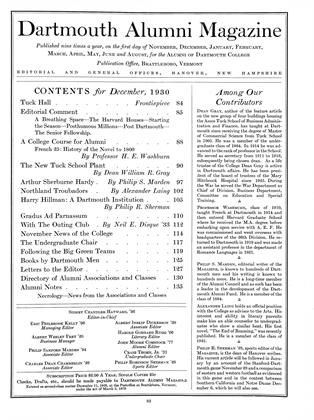Published by The Arts. $2.00. Edition limited to 750 copies.
President Hopkins in his opening address this year urged the College to an awareness of moonlight on Moosilauke and the chiaroscuro of snow in northern forests. He also pointed out that beauty and the materials of poetry were to be found in the equipment of modern industrialism—in skylines of great cities, powerhouses, and hungry mills.
The undergraduate poets, in this second Arts anthology, have followed his advice. In spots they have captured the cold splendor of winter hills. They know the feel of ski harness and the curves in the D. O. C. trails. This much of the volume is about Dartmouth -—a Hanover credo natural to do, but well done.
But they have also reached out beyond Webster Avenue and South Park Street. Steel things and city tones have come back with them to the country; have crystalized into more than temporary filaments; and have gone smashing out into crisp print that sings of skyscrapers and locomotives. There's an energy here that's far from snowbound. It isn't hill music but it has hill strength. It belongs.
The introduction says of the verses "youth is their first virtue." Maybe. But the liftthe singing-in-the-high-voice part of the book is neither juvenile nor beardless. Youth here knows its way around. You'll find the lift (at least I did) principally in portraiture. And in this portraiture you'll find reachclinical, geographical and spiritual. These poets have been recording on canvas instead of on film. Character portrayal here seems more than a mere tickling sensation—it's pretty genuine stuff. People are painted in more than disconnected, impressionistic phrases. The diction is in an American language but it isn't hardboiled. In fact there is much more humanity here than in most collegiate anthologies. That doesn't mean that these poets are soft. Somehow they have been able to sing without that raucous realistic harshness that changes too much undergraduate verse into the screaming distortion that results from too much volume and too little modulation.
We hear a lot these days about undergraduate cynicism. This verse doesn't reflect it. And, thank Heaven, it doesn't depend on "cleverness" for its drive. On the other hand, it lacks the buoyancy of Hovey-although there are overtones of vagabondia. It's closer to the Selective Process than it is to John Ledyard—which is as it should be—this is 1930.
It is a quotable book—but somehow it seems like amputation to wrench a few tiny lines away from its parent poem. I'd like to quote Courtney Anderson's Advice to Scholars. Hovey would have loved it. Sonnet to Disprove Mathematics by Casseres couldn't have been written under anything but a Hanover date-line. Reuel Denney's Who Can KnowWinter? will make alumni wonder if they really knew Hanover. Gilmore's Construction, Levi's Affinities and A versions-but why list titles? I must quote. This is one of Carlos Baker's:
CREATION
One day I watched a child upon the sands Who fashioned tiny men with baby's touch; Then, with her shovel held in dimpled hands, Beheaded each, lest he should know too much.
But pity found its way into her heart And so, into the top of every head, She thrust a crumbly bit of jelly tart,
Then glanced at me and smiled—"For brains," she said.
It seems to me that God made souls that way, By this same sea, in this same sun's long beams; Using not bits of jelly tart that day, But love and hope and little wisps of dreams.
And here is one sonnet by Kimball Flaccus that should make you want to read the others in his Sequence:
The noble gods will not be long alone, For out of earth great-hearted kings will rise, Proud queens, and poets with madness in their eyes, And the lean-sinewed artisans in stone. Lifting his beard from the sea foam once more,
Neptune will glimpse the heroic men of old, Achilles armed in splendor, and the bold Ulysses wandering along the shore.
Another Troy with slim, star-fingering spires Will stand besieged, and when the trumpet's bark Has died away, and men have sought the fires, And silence hovers, ominous and deep, Some slender-throated Helen in the dark, Still listening, will sob herself asleep.
It is a book of prophecy. Ten books have been published by contributors to a similar Arts Anthology in 1925. We predict that the contributors to this 1930 volume will do as well.
 View Full Issue
View Full Issue
More From This Issue
-
 Article
ArticleThe New Tuck School Plant
December 1930 By Dean William R. Gray -
 Article
ArticleDirectory of Alumni Associations and Classes
December 1930 -
 Article
ArticleArthur Sherburne Hardy
December 1930 By Philip S. Marden -
 Article
ArticleHarry Hillman: A Dartmouth Institution
December 1930 By Phil Sherman -
 Lettter from the Editor
Lettter from the EditorEditorial Comment
December 1930 -
 Class Notes
Class NotesCLASS OF 1923
December 1930 By Truman T. Metzel
Books
-
 Books
BooksFACULTY PUBLICATIONS
MARCH, 1928 -
 Books
BooksAlumni Publications
October 1944 -
 Books
BooksHUSBANDS & WIVES: THE DYNAMICS OF MARRIED LIVING. "
January 1961 By FRANCIS E. MERRILL '26 -
 Books
BooksL'HÉRITAGE FRANCAIS.
January 1954 By GEORGE E. DILLER -
 Books
BooksBRITISH ORDERS AND DECORATIONS.
December 1973 By JOHN HURD '21 -
 Books
BooksPRINTING AS AN ART.
May 1955 By THOMSON H. LITTLEFIELD '41


